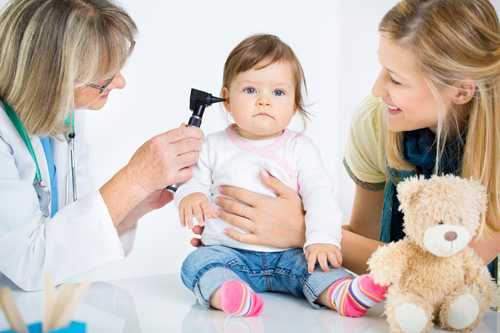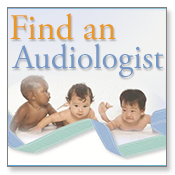Facts

Hearing Loss in Children
Hearing loss can affect a child’s ability to develop speech, language, and social skills. The earlier children with hearing loss start getting services, the more likely they are to reach their full potential. If you think that a child might have hearing loss, ask the child’s doctor for a hearing screening as soon as possible. Don’t wait!
What is Hearing Loss?
A hearing loss can happen when any part of the ear is not working in the usual way. This includes the outer ear, middle ear, inner ear, hearing (acoustic) nerve, and auditory system.
Signs and Symptoms
The signs and symptoms of hearing loss are different for each child. If you think that your child might have hearing loss, ask the child’s doctor for a hearing screening as soon as possible. Don’t wait!
Even if a child has passed a hearing screening before, it is important to look out for the following signs.
Signs in Babies
- Does not startle at loud noises.
- Does not turn to the source of a sound after 6 months of age.
- Does not say single words, such as “dada” or “mama” by 1 year of age.
- Turns head when he or she sees you but not if you only call out his or her name. This sometimes is mistaken for not paying attention or just ignoring, but could be the result of a partial or complete hearing loss.
- Seems to hear some sounds but not others.
Signs in Children
- Speech is delayed.
- Speech is not clear.
- Does not follow directions. This sometimes is mistaken for not paying attention or just ignoring, but could be the result of a partial or complete hearing loss.
- Often says, “Huh?”
- Turns the TV volume up too high.
Babies and children should reach milestones in how they play, learn, communicate and act. A delay in any of these milestones could be a sign of hearing loss or other developmental problem. Visit our web page to see milestones that children should reach from 2 months to 5 years of age.
Screening and Diagnosis
Hearing screening can tell if a child might have hearing loss. Hearing screening is easy and is not painful. In fact, babies are often asleep while being screened. It takes a very short time — usually only a few minutes.
Babies
All babies should have a hearing screening no later than 1 month of age. Most babies have their hearing screened while still in the hospital. If a baby does not pass a hearing screening, it’s very important to get a full hearing test as soon as possible, but no later than 3 months of age.
Children
Children should have their hearing tested before they enter school or any time there is a concern about the child’s hearing. Children who do not pass the hearing screening need to get a full hearing test as soon as possible.
Learn more about screening and diagnosis »

Treatments and Intervention Services
No single treatment or intervention is the answer for every person or family. Good treatment plans will include close monitoring, follow-ups and any changes needed along the way. There are many different types of communication options for children with hearing loss and for their families. Some of these options include:
- Learning other ways to communicate, such as sign language
- Technology to help with communication, such as hearing aids and cochlear implants
- Medicine and surgery to correct some types of hearing loss
- Family support services
Learn more about treatments and intervention services »
Is Your Child "At Risk" for Hearing Loss?
Causes and Risk Factors
Hearing loss can happen any time during life – from before birth to adulthood.
Following are some of the things that can increase the chance that a child will have hearing loss:
- A genetic cause: About 1 out of 2 cases of hearing loss in babies is due to genetic causes. Some babies with a genetic cause for their hearing loss might have family members who also have a hearing loss. About 1 out of 3 babies with genetic hearing loss have a “syndrome.” This means they have other conditions in addition to the hearing loss, such as Down syndrome or Usher syndrome. Learn more about the genetics of hearing loss »
- 1 out of 4 cases of hearing loss in babies is due to maternal infections during pregnancy, complications after birth, and head trauma. For example, the child:
- Was exposed to infection, such as , before birth
- Spent 5 days or more in a hospital neonatal intensive care unit (NICU) or had complications while in the NICU
- Needed a special procedure like a blood transfusion to treat bad jaundice
- Has head, face or ears shaped or formed in a different way than usual
- Has a condition like a neurological disorder that may be associated with hearing loss
- Had an infection around the brain and spinal cord called meningitis
- Received a bad injury to the head that required a hospital stay
- For about 1 out of 4 babies born with hearing loss, the cause is unknown.
Prevention
Following are tips for parents to help prevent hearing loss in their children:
- Have a healthy pregnancy.
- Learn how to during pregnancy.
- Make sure your child gets all the regular childhood vaccines.
- Keep your child away from high noise levels, such as from very loud toys. Visit the National Institutes of Health’s website to learn more about preventing noise-induced hearing loss.
Get Help!
- If you think that your child might have hearing loss, ask the child’s doctor for a hearing screening as soon as possible. Don’t wait!
- If your child does not pass a hearing screening, ask the child’s doctor for a full hearing test as soon as possible.
- If your child has hearing loss, talk to the child’s doctor about treatment and intervention services.
Hearing loss can affect a child’s ability to develop speech, language, and social skills. The earlier children with hearing loss start getting services, the more likely they are to reach their full potential. If you are a parent and you suspect your child has hearing loss, trust your instincts and speak with your child’s doctor.
- Page last reviewed: October 23, 2015
- Page last updated: October 23, 2015
- Content source:



 ShareCompartir
ShareCompartir